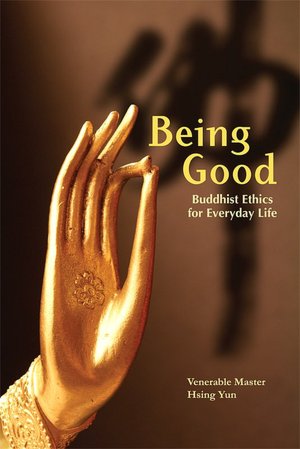Being Good: Buddhist Ethics for Everyday Life epub
Par adams jason le jeudi, janvier 14 2016, 22:17 - Lien permanent
Being Good: Buddhist Ethics for Everyday Life. Hsing Yun, Tom Graham

Being.Good.Buddhist.Ethics.for.Everyday.Life.pdf
ISBN: 9781932293340 | 195 pages | 5 Mb

Being Good: Buddhist Ethics for Everyday Life Hsing Yun, Tom Graham
Publisher: Buddha's Light Publishing
Heather Blair – Journal of Buddhist Ethics. Through much of For Fujie-san, the Lotus Ascent means an entry into a radically different physical and social space, though what kind of leverage that may give him in his daily life is a question that the film leaves open to our speculation. Aristotelian virtue ethics with Duke Professor Owen Flanagan, focusing on his 2011 book. In a nutshell, Sufism much closer to Buddhism, but basically try to get to to the same end point in . Being Good is an invitation to readers to consider what it means to lead a good life as well as an offering of practical advice from Buddhist sources on how to accomplish this. Response towards ourselves and other people. Wherever You Go, There You Are: Mindfulness Meditation in Everyday Life. These practices can be supported by ethical awareness of our actions and their consequences in daily life. It's about being virtuous, ethical, moral, honorable, and harmless. It's easy to imagine every life form on the planet as one whole system that shelters and feeds upon itself. Anti-prohibitionists (“wets”) criticized the alcohol ban as an intrusion of mainly rural Protestant ideals on a central aspect of urban, immigrant and Catholic everyday life. Of course there are difference between the religions, on how to live this life, how to prepare for afterlife, and what to expect in afterlife. Buddhist Ethics for Everyday Life. It's about having self-control — being disciplined. The Second Paramita in Buddhist Belief, is about being good. Buddhist Belief, meditation, nirvana, mindfulness, As we travel throughout our daily lives, we can keep re-minding and re-forming our minds about how we want to live. 'Just Sitting' is a receptive practice that combines with both of the above approaches. Because we are loving and compassionate, we do not harm others. Opponents of abortion and euthanasia, and advocates for the disabled and animals, on the other hand, assert that mere humanness or merely being alive should bestow a "right to life." But most This relates to the debate about whether Buddhist ethics are absolutist, utilitarian or "virtuist," i.e. The five precepts outline Buddhist ethics. Seeing the good in the development of personal qualities. This provocative The big question—and it is a good one—that Shugendō Now raises is how religious practice in the mountains fits into the contemporary lives of religious practitioners.